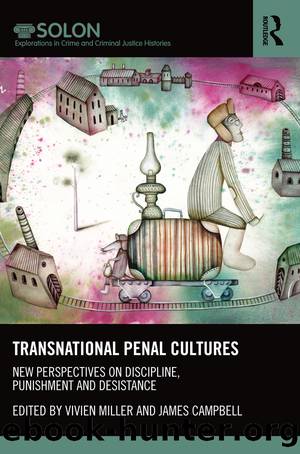Transnational Penal Cultures by Vivien Miller James Campbell

Author:Vivien Miller, James Campbell [Vivien Miller, James Campbell]
Language: eng
Format: epub
ISBN: 9781138288423
Barnesnoble:
Publisher: Taylor & Francis
Published: 2016-11-30T00:00:00+00:00
1
For a general discussion of how such power is expressed through more pervasive and subtle means, see Michel Foucault, Discipline and Punish: The Birth of the Prison (1975; 2nd edition, New York: Vintage, 1995). For how the instruments of surveillance and control developed, specifically in the British context, see V. A.C. Gatrell, âCrime, Authority, and the Policeman-State,â in F.M.L. Thompson (ed.), The Cambridge Social History of Britain, 1750â1950 v. 3: Social Agencies and Institutions (Cambridge: Cambridge University Press, 1990), 243â310.
2
For essays on the application of Foucaultâs thought to the former, see Michael Dillon and Andrew W. Neal (eds), Foucault on Politics, Security and War (Basingstoke: Palgrave Macmillan, 2011).
3
For the long history of such mechanisms, and the role of observation in disciplining its targets, see Foucault, Discipline and Punish; David Wood, âFoucault and Panopticism Revisited,â Surveillance & Society 1.3 (2003), 234â9.
4
For a discussion of the genocidal component of the US-led hostilities against Iraq in the last two decades, see Edward S. Flerman and David Peterson, The Politics of Genocide (New York: Monthly Review Press, 2010), 29â38.
5
The parent legislation, the Defence of the Realm Act 1914, was passed on 8 August, shortly after the commencement of the First World War.
6
âRaids on Chinese Opium Dens in Liverpool on 9th June 1917,â Flome Office: Registered Papers 45/24683/311604/28 (hereafter HO 45) (originally registered under two subjects: Dangerous Drugs and Poisons: Deportation of Chinese opium smugglers (1916â1920) [Former Reference: 311604] and Aliens: Deportation of Chinese opium smugglers (1916â1920) [Former Reference: 311604]).
7
âOpium Smugglers at Liverpool,â HO 45/11. This comment was signed by Sidney West Harrison, who was the private secretary to the Permanent Under-Secretary of State, so it is unclear whether it was Harrisonâs comment or that of the Under-Secretary himself.
8
East London Advertiser, 27 June 1916.
9
East End News [London], 27 June 1916.
10
Virginia Berridge, âEast End Opium Dens and Narcotic Use in Britain,â London Journal 4.1 (1978), 16; Marek Kohn, Dope Girls: The Birth of the British Drug Underground (London: Lawrence & Wishart, 1992), 44. The parent legislation, the Defence of the Realm Act, had been passed on 8 August 1914. Initially intended as a means of safeguarding the secrecy of military operations and communications, it eventually became the basis for much of the governmentâs control over the civilian population. The regulations passed under the auspices of DORA in the years following its inception allowed for the censorship of anti-war publications, imprisonment without trial, the requisition of property and resources for government use, limiting hours of opening for public houses and, starting in 1918, the rationing of certain foodstuffs. DORA applied to Great Britain, but not beyond or to the colonies (though Australia passed the War Precautions Act 1914, which was modelled on DORA, and Canada had much sterner legal controls on opium, which dated to 1908).
11
Times, 11 February 1916, 3. For a more detailed discussion of the Folkestone case, see Kohn, Dope Girls, 34.
12
Times, 12 February 1916, 3.
13
A correspondent who wrote to the Times in July similarly emphasized the sinister foreign involvement in the drug trade, claiming,
Download
This site does not store any files on its server. We only index and link to content provided by other sites. Please contact the content providers to delete copyright contents if any and email us, we'll remove relevant links or contents immediately.
European Witch Trials (RLE Witchcraft) by Richard Kieckhefer(85)
Constitutional Law by Erwin Chemerinsky;(77)
Sentencing and Artificial Intelligence by Ryberg Jesper;Roberts Julian V.;(77)
Solve Your Money Troubles by Amy Loftsgordon;Cara O'Neill;(68)
Dictionary of American Criminal Justice by Dean J. Champion(58)
The Eternal Criminal Record by James B. Jacobs(55)
Roman Law and Economics by unknow(52)
The Supreme Court's Role in Mass Incarceration by William T. Pizzi(50)
Revitalizing Victimization Theory by Travis C. Pratt Jillian J. Turanovic(48)
Crime and the Life Course by Michael L. Benson(48)
The Legal Guide for Museum Professionals by Courtney Julia;(44)
Policing the Police : Knowledge Management in Law Enforcement by Petter Gottschalk(43)
Law for Student Police Officers by Merritt Jonathan;(43)
Juvenile Risk and Needs Assessment by Christopher J. Sullivan Kristina K. Childs(42)
Incarceration without Conviction by Mikaela Rabinowitz(42)
Transnational Penal Cultures by Vivien Miller James Campbell(41)
A Constitution for the Living by Beau Breslin(41)
Juvenile Homicides : A Social Disorganization Perspective by Minna K. Laurikkala(38)
Lawyers, Lead On by Williford Rebecca S.;Basas Carrie A.;Enyart Stephanie L.;(36)
